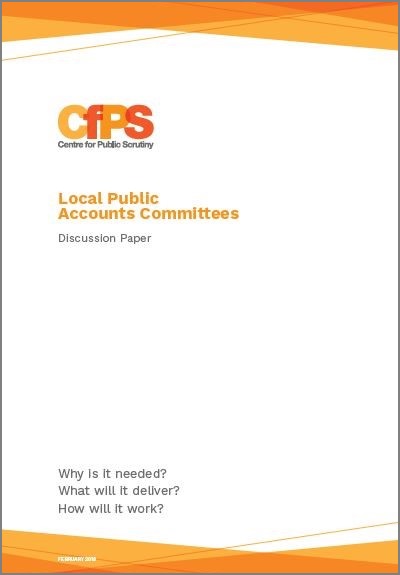Local Public Accounts Committees
Why is it needed?
What will it deliver?
How will it work?
The Centre for Governance and Scrutiny believes that current accountability arrangements are not strong enough for the increasingly complex landscape that characterises public service delivery in many localities. CfGS believes that local Public Accounts Committees (PACs) should be created which would help secure better value for money, reduce the dangers of democratic deficit and overcome current barriers to proper scrutiny.
We are launching a discussion paper which sets out the details of our proposal, why local PACs are needed, what they will deliver and how they could work. We are inviting views from across local and national stakeholders, as well as actively seeking regional partners to help pilot the idea.
Why are local Public Accounts Committees needed?
Since we first mooted the concept of local PACs in March 2015, there have been several new developments which make this idea more urgent, such as:
 Concerns about the governance of Local Enterprise Partnerships (LEPs);
Concerns about the governance of Local Enterprise Partnerships (LEPs);- Developments in healthcare such as Sustainability and Transformation Partnerships and Accountable Care Systems;
- High profile failures in response to disasters such as the Grenfell Tower fire;
- Changes to the governance and funding of education.
The complexity that now exists in the way services are structured and delivered means that accountability for the way tax payer’s money is spent is often far from clear. A new body, a local Public Accounts Committee, could mirror the remit of the Westminster Public Accounts Committee at a more local level, and be tasked with following the public pound and bridge current gaps in accountability.
What will local Public Accounts Committees deliver?
A local PAC would engage head-on with the challenge of the governance of complexity. To be effective in doing this it would need to focus not on the structures of partnerships, the legal relationships between partners or the way that performance and delivery are “formally” managed, but on culture.
They will exist to act – to identify, act and report on risks, to knock heads together, to give local organisations, Government and local people the confidence and assurance that public services are properly joined up, and to shine a light on novel delivery methods which might currently sit outside the governance systems of any one organisation. They are about promoting a culture of innovation, learning, sharing and openness – between partners, and between partners and the public.
How will local Public Accounts Committees work?
The local PAC would not look at the day-to-day activities of individual organisations – which have their own, existing governance arrangements. It would, however, need to be aware of the roles, duties and work of those organisations, using that insight to look at the way these individual organisations interact. In particular, it would examine the way that value for money is used as a driving force to align the priorities of different bodies delivering public services.
There would be an expectation that broader, systemic issues identified through the governance systems of individual organisations might be “escalated” to the PAC. The PAC could also provide support and advice to those engaged in non-executive activity in the local area.
Importantly, a local PAC model would be scalable and sustainable. Its strategic focus would mean that, as more services come under local control (and hence the purview of the PAC), substantial changes to its means of operation would not be necessary.
Next steps
More detail about how local PACs would work, what powers they might have, how they would be constituted and how they would be funded are detailed in our discussion paper.
We are keen to hear views from people across a wide range of sectors as well as local leaders, scrutineers, academics, national representative bodies and others on this proposal, and specifically seek views, comments and suggestions on the following questions:
- How can agreement be brokered on the central point of the need for a local PAC, amongst a sufficiently broad range of organisations to make such a body viable?
- Is there an “optimum” operating model for a PAC with the powers we have set out – or is it right that there be significant divergence between areas based on local need and appetite?
- How much of a challenge is it for a local PAC to engage in the cultural aspects of its work – particularly when that involves engaging in the internal culture, behaviours, attitudes and values of decision-makers in individual organisations?
- What level of co-operation is required with existing governance systems?
- Is “value for money” as we have defined it an adequate focus and driver for the PAC’s work?
- How can local people be involved in the PAC’s work?
- How can we have confidence that local PACs – individually and collectively – are working to deliver the kind of outcomes we hope?
Views and comments should be sent to CfGS Director of Research, Ed Hammond – ed.hammond@cfgs.org.uk by 23rd March 2018. You can also send us comments on twitter @CfGScrutiny #localPACs.





